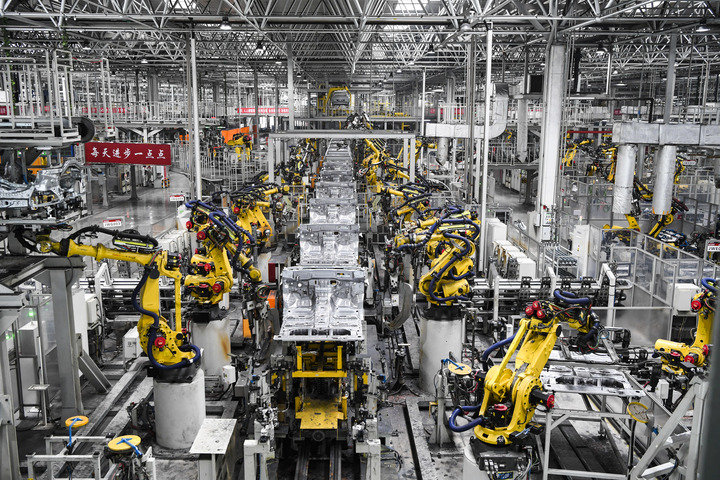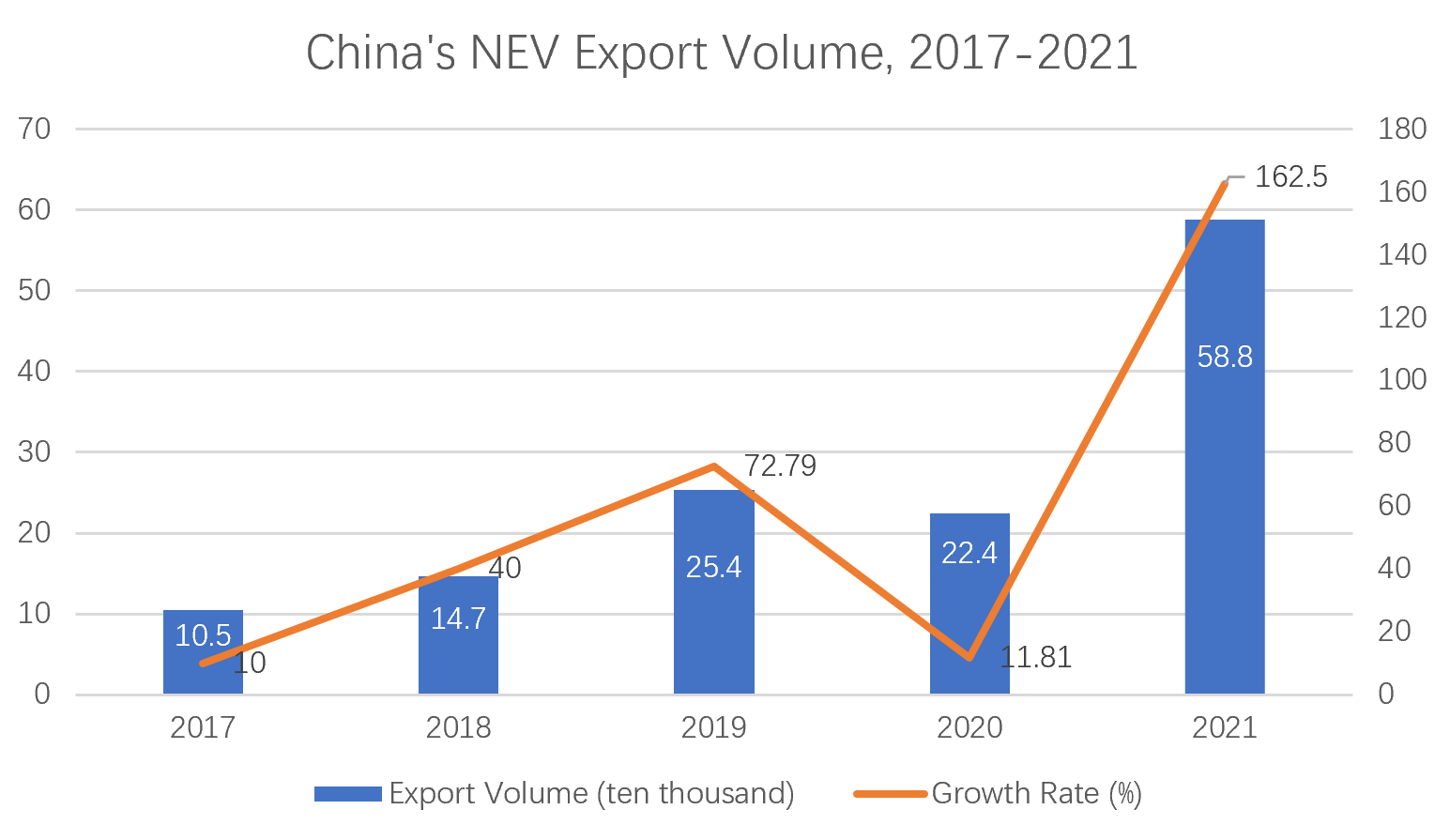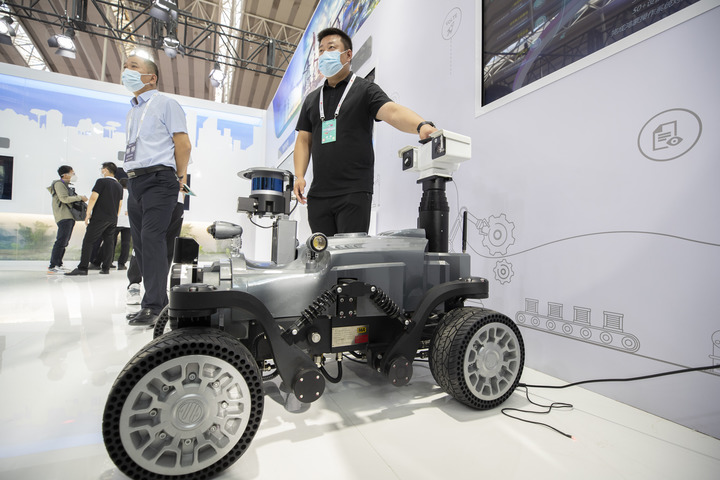China Resilience: China's intelligent manufacturing gains a foothold globally in 2022

Photo taken on Sept. 22, 2022 shows an intelligent production base of the Great Wall Motors (GWM) in Yongchuan District of Chongqing, southwest China. (Xinhua/Wang Quanchao)
The added value of China's manufacturing industry had soared from 16.98 trillion yuan in 2012 to 31.4 trillion yuan in 2021, keeping China as the world's largest manufacturer. Intelligence is one of the important choices for China to seek high-quality development.
China is the world's largest consumer market and technology application market with constantly upgrading intelligent technologies. By means of intelligence, China has contributed to the recovery of the world economy.
The booming new energy vehicles (NEVs), BeiDou Navigation Satellite System, Artificial Intelligent (AI) and other industries manifest the steady growth and quality improvement of China's manufacturing industry in the past decade. They also further enhance the comprehensive strength, innovation, and international competitiveness of China's manufacturing industry.
-- NEV leads China's intelligent manufacturing to go global
In recent years, China's NEVs have gained popularity in global market.
According to data released by the China Association of Automobile Manufacturers (CAAM), China's auto export volume had hovered around 1 million for nearly a decade. However, thanks to the NEV boom, a leap from 1.059 million to 2.138 million occurred for the first time in 2021.
CAAM data showed that in the first 10 months of 2022, China’s auto export volume amounted to 2.456 million, a year-on-year increase of 54.1 percent, exceeding the total export volume of last year. Among them, the export volume of NEVs came to 499,000 units, up 96.7 percent year on year, with a market share of 20.3 percent.

Source: General Administration of Customs (GAC), China Passenger Car Association (CPCA)
Why are Chinese vehicles so popular with foreign consumers?
According to CAAM Deputy Chief Engineer Xu Haidong, in the short term, Chinese vehicles are popular with foreign consumers for two reasons. First, overseas markets are gradually recovering and the overall environment is getting better. Second, China has a more complete supply chain than other countries, which brings domestic automakers a good opportunity to establish presence in overseas markets. In the long run, Chinese auto products become more competitive.
"We have improved our design capabilities and customer experience, optimized product appearance design, quality control and management, enhanced our technological innovation and integration capabilities, and innovated our service system," Xu Haidong added.
In addition, the NEV boom has become an important driver for China’s high-quality export growth.
It is noted that in the first half of 2022, global NEVs sales exceeded 4.22 million, a year-on-year increase of 66.3 percent, of which China accounted for more than 60 percent of global NEVs sales, up 115 percent year on year.
Europe has become a new export destination for many Chinese-made NEVs. According to GACC statistics, in the first half of 2022, China’s NEV passenger vehicles exported to Western Europe accounted for 34 percent of the total. Among Western European countries, Belgium imported the most NEVs from China.
Through further cooperation with world-renowned automakers, many Chinese NEV brands have gained a foothold in auto manufacturing powerhouses.
In November 2022, a large German car rental company signed a cooperation agreement with BYD, China’s leading auto maker. In the next six years, it will purchase at least 100,000 NEVs and put them in the German high-end car rental market and seek further cooperation opportunities with BYD. In July this year, BYD Japan announced its official entry into the Japanese passenger car market and unveiled three models at a product launch event held in Tokyo.
As of the end of October this year, Great Wall Motor's (GWM) overseas sales exceeded 130,000 units, a year-on-year increase of 18.55 percent, and NEVs have become a new growth pole of exports, according to GWM Vice President Fu Xiaokang.
It is learnt that GWM has established presence across Europe, ASEAN, the Middle East, South America, Oceania, and South Africa. The company has also established full-process vehicle production bases in Thailand and Brazil, and gradually completed a global Research and Development (R&D) system.
Bai Ming, a researcher at the Chinese Academy of International Trade and Economic Cooperation (CAITEC), said that global automakers are under pressure from chip shortages and rising raw material prices. In this context, Chinese-made EVs play an increasingly important role in the global NEV industry chain by taking advantage of strong domestic industry chain and supply chain and advanced intelligent connected vehicle (ICV) technology, thus becoming a new fulcrum to stimulate China's foreign trade growth.
Cui Shudong, CPCA Secretary-General said that,China has led the world for many years in NEV production and sales, entering the full market expansion period. The great changes in China's auto manufacturing in the past 20 years from technology introduction in the era of traditional fuel vehicles to NEVs going global signify the rise of China's high-end manufacturing industry.
Cui added that in the future, as the NEV technology matures, domestic automakers such as BYD, SAIC, Geely, GWM and Chery will further change the international automobile market landscape.
-- BeiDou curtains up new era for Chinese intelligent manufacturing to benefit the world
The BeiDou Navigation Satellite System (BDS) is independently developed and operated by China to meet the needs of national economic and social development. After years of development, BDS has become an important new infrastructure that provides all-weather, all-time and high-precision positioning, navigation and timing services for global users.
The State Council, the Chinese cabinet, issued a white paper titled China's BeiDou Navigation Satellite System in the New Era, and introduced its main contents on November 4, 2022. Ran Chengqi, director of China Satellite Navigation Office and spokesperson of BDS, said that the 30 satellites in orbit of BeiDou-3 constellation are in good condition, and millions of components of more than 300 types on the satellites are all made in China. BDS has entered a fast track of large-scale application. In 2021, the output value of China's satellite navigation and location-based services (LBS) totaled about 470 billion yuan, with a compound annual growth rate of over 20 percent.
The BeiDou Ground-based Augmentation System provides users with real-time meter-level, decimeter-level, centimeter-level or post-processing millimeter-level high-precision positioning services. It has provided more than 1.5 billion users in more than 230 countries and regions with the BDS accelerated positioning and high-precision services, with a total of 2 trillion times of service and nearly 3 billion times of service per day.
As China's first space infrastructure that provides public services to the world, BDS and related products have been applied in an increasing number of African countries. It has generated significant economic and social benefits, and become a new engine for the improvement and upgrading of China-Africa cooperation.
For example, in Africa's largest rice planting project in partnership with China, which covers an area of 20,000 hectares in Xai Xai city in southern Mozambique, plowing, planting, managing and harvesting used to be arduous for local farmers.
Thanks to BDS-based agricultural technology innovation, doing farmwork has become easier. With positioning data from BDS, farmers can set up pre-mapped routes on their cell phone, and the drones will spray pesticides accordingly. The buzzing machines can spray pesticides over 6-odd hectare of farmland per hour, 25 times faster than manual operation. They can also work at night.

A harvester is seen at Wanbao rice farm in Gaza province, Mozambique, April 4, 2018. (Xinhua)
Such drones are widely applied in the China-Africa Xai-Xai agricultural cooperation project in areas of farmland surveying and mapping, rice sowing, pesticide spraying, etc. Local large and medium-sized tractors are also equipped with BDS-empowered automatic driving system.
The BDS is technologically advanced and multifunctional with innovative design in constellation configuration, technical system and service functions. So far, it has reached a positioning accuracy of 5 meters or even 2-3 meters in some areas, well above its design target of 10 meters. Its timing accuracy has also exceeded the target of 20 nanoseconds, reaching 10 nanoseconds, said Ran Chengqi.
In Saudi Arabia, BDS has been applied in urban municipal infrastructure construction and the positioning of people or vehicles in deserts. In Tajikistan, BDS-based dam deformation monitoring ensures the safety of the dam and local people. In Burkina Faso, the application of BDS in precise surveying and mapping for hospital construction shortens construction time by more than half, contributing to local pandemic prevention and control, according to Ran.
He added that BDS has also been used in the operation of China-Europe freight trains and other fields in ASEAN, South Asia, Eastern Europe and North Africa.
Yang Changfeng, chief designer of the BDS said the original aspiration of building BDS is to serve the world and benefit mankind. As BDS gains increasing recognition worldwide, it is further boosting international aerospace cooperation.
During the 14th Five-Year Plan Period (2021-2025), BDS will provide more products and services for overseas markets under the framework of the Belt and Road Initiative (BRI), Yang said.
According to the white paper, China will intensify cooperation with ASEAN, the League of Arab States, the African Union, and the Community of Latin American and Caribbean States to launch BDS application solutions in smart city, public security, precision agriculture, digital transportation, and disaster prevention and mitigation, which are being piloted in Asia, Africa and Latin America.
The white paper also tells that in the years to come, China will further upgrade BDS technologies, functions and services. The goal is to create a comprehensive spatiotemporal system that is more extensive, integrated, intelligent, and able to provide flexible, smart, precise and secure navigation, positioning and timing services. In doing so, China will help improve people's wellbeing and promote human progress.
-- China's AI industry contributes to global trend of intelligent production and life

Exhibitor introduces a 5G mining robot at the 2022 World 5G Convention in Harbin, capital of northeast China's Heilongjiang Province, Aug. 11, 2022. (Xinhua/Zhang Tao)
With strong policy support, China's artificial intelligence (AI) industry has been flourishing in recent years.
On August 15, the Ministry of Science and Technology announced to support the construction of ten AI demonstration application scenarios, including smart farm, intelligent port, intelligent mine, smart factory, smart home, smart education, automatic driving, intelligent diagnosis and treatment, smart court and intelligent supply chain, so as to to promote use of AI and foster new economic growth engine.
So far, the scale of China's core AI sectors has exceeded 400 billion yuan, Zhang Yunming, vice minister of industry and information technology, said last month at a forum during the 5th China International Import Expo.
The rise of China's AI industry has made "intelligent manufacturing in China" become one of the key words of the globalized development of manufacturing industry.
Recently, an intentional cooperation agreement on Thailand's first "5G+ automatic driving"-highlighted smart and green mine project was signed by China's Qingdao Waytous Intelligent Machine Co., Ltd. (Waytous) and Zhengzhou Yutong Mining Equipment Co., Ltd. with Thailand's Siam Cement Group (SCG) and Advanced Info Services Public Company Limited (AIS).
This project located in the Saraburi mining area of SCG in Thailand involves a total investment of 10 million U.S. dollars. With the integrated application of cutting-edge technologies such as 5G, AI, automatic driving, and cloud computing, the mine will be built into a green, intelligent, efficient and safe model in Thailand and even Southeast Asia.
During project construction period, Waytous will provide intelligent and unmanned technologies to ensure the automatic driving, smart dispatching and intelligent collaboration of new energy tramcars, thus helping forge China's first overseas automatic driving project in mining areas.
In the field of smart home, innovative smart home products made by Chinese manufacturers, such as sweeping robots, smart pet products, smart lamps and smart door locks, are gaining popularity among overseas consumers, according to Amazon Global Selling.
Chinese home appliance enterprise Haier Smart Home (600690.SH) said on November 3 that its brand Casarte has gained a foothold in South Asia, Southeast Asia, and Europe this year.
In August, Casarte set up its first full-scenario smart home experience center at the CentralWorld shopping hub in Bangkok, Thailand.
In September, Casarte brought complete household appliances and high-end intelligent scenarios to Internationale Funkausstellung Berlin (IFA) Berlin, one of the oldest industrial exhibitions in Germany, further enhancing its brand awareness in Europe.
- Chinese auto brand Jetour invites global media and user representatives to visit Fuzhou intelligent factory
- Chongqing Cultural Expo forges global links, showcasing innovation and heritage
- GLOBALink | Foreign experience officer witnesses advanced skills of intelligent robots in SW China
- Expo highlights intelligent manufacturing in Northeast China


